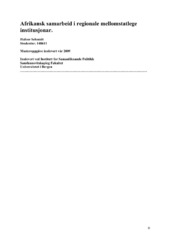Afrikansk samarbeid i regionale mellomstatlege institusjonar.
Master thesis
Permanent lenke
https://hdl.handle.net/1956/4134Utgivelsesdato
2009-05-20Metadata
Vis full innførselSamlinger
Sammendrag
The thesis deals with interstate cooperation in African regional institutions, and poses the question: What characterizes African interstate cooperation as opposed to regional cooperation in other world regions. Institutional design is sought to be explained using the framework offered by Acharya and Johnston (2007) with the following independent variables: History; cooperation problem;N of actors; ideology and identity; systemic and subsystemic power distributions; domestic politics; and extra-regional instittions and non-state actors. Using the litterature on international institutions in general, and on African interstate regional institutions in specific, the thesis is an implicitly comparative case study on the African continent. Data beiing utilized in the thesis include constitutional acts, charters, declarations and decisions of the institutions OAU, AU, NEPAD, APRM and SADC. The thesis concludes that the African colonial heritage was crucial to the design of the OAU, and indeed still is important to the understanding of African regional institutions' design. The maintaining of the African border regime is a case in point. While Pan-Africanism was important for the formation process of the OAU, and certainly is an important feature still in the constitutive act of the AU, the conservative leaders far outnumbered the radicals supporting full politcal union of the continent when founding the OAU, and so nationalism, and not Pan-Africanism, became the leading norm. The thesis is cautiously optimistic that the APRM process may be seen to lift the veil of the non-intervention norm of previous Pan-African initiatives, as the participating states are opening up their domestic affairs for review. The APRM, allthough still facing challenging obstacles, is popular among good governance craving donor countries, and as a consequence, increasingly so in African countries as well.
Utgiver
The University of BergenOpphavsrett
The authorCopyright the author. All rights reserved
